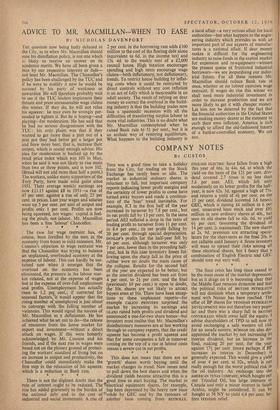ADVICE TO MR. MACMILLAN-WHEN TO EASE
Ry NICHOLAS DAVENPORT
THE question now being hotly debated in the City, as to when Mr. Macmillan should ease his disinflation policy, is not one which is likely to receive an answer on its academic merits. We have all been given a bias by our respective interests or fads— not least Mr. Macmillan. The Chancellor's policy has been challenged by the TUC and if he were to mollify it now he would be accused by his party of weakness or cowardice. He will therefore probably wait to see if the TUC leaders implement their threats and press unreasonable wage claims this winter. If they do, he will not relax his squeeze: he may even be wrongly per- suaded to tighten it. But he is hoping—and playing—for moderation. He has said that he had no serious disagreement with the TUC: his only plaint was that if they wanted to get more than a pint out of a pint pot they had better get a larger pot and brew more beer, that is, increase their output, which is sound enough advice. His plea for moderation is backed up by the retail price index which was 103 in May, when he said it was not likely to rise more than two or three points, and is now 102. (Bread will not add more than half a point.) The workers, unlike many supporters of the Tory Party, have made solid gains since 1951. Their average weekly earnings are now £11.15 against £8 in 1951—a rise of 45 per cent. against a rise of only 25 per cent. in prices. Last year wages and salaries went up 5 per cent. per unit of output and profits only 1 per cent. Profits are now being squeezed, not wages: capital is feel- ing the pinch, not labour. Mr. Macmillan has been a fine 'labour' Chancellor.
The case for wage restraint has, of course, been fortified by the turn in the economy from boom to mild recession. Mr. Cousins's objection to wage restraint was that the Chancellor was trying to balance an unplanned, overloaded economy at the expense of labour. This can hardly be sus- tained now when it emerges that the overload on the economy has been eliminated, the pressure in the labour mar- ket relaxed, not at the expense of wages but at the expense of over-full employment and profits. Unemployment has actually risen to 1.2 per cent.; if corrected for seasonal factots,'it would appear that the rising number of unemployed is just about to converge with the falling number of vacancies. This would signal the success of Mr. Macmillan as a deflationist. He has achieved what he set out to do—the release of resources from the home market for export and investment—without a direct attack on wages. If this were honestly acknowledged by Mr. Cousins and his friends, and if the next rise in wages were based not on the phoney ground of protect- ing the workers' standard of living but on an increase in output and productivity, the Chancellor could immediately make the first step in the relaxation of his squeeze,
which is a reduction in Bank rate.
* * *
There is not the slightest doubt that the rate. of interest ought to be reduced. The rise has added grievously to the burden of the national debt and to the cost of industrial and social investment. A rise of 2 per cent. in the borrowing rate adds £100 million to the cost of the floating debt alone (equivalent to 6d. in the income tax) and 15s. 4d. to the weekly rent of a £2,000 council house. High taxation encourages spending and high rents encourage wage claims—both inflationary, not deflationary, trends. To restrict house building by inflat- ing costs when it could be restricted by direct controls without any cost inflation is an act of folly which is inexcusable in an adult society. The result of relying on dear money to correct the overload in the build- ing industry is that the building trades now face a spasmodic recession with all the difficulties of transferring surplus labour to more vital industries. This is no doubt what Mr. Macmillan contemplated when he raised Bank rate to 54 per cent., but it is an archaic way of restoring equilibrium. What happens to the building industry is
a local affair—a very serious affair for local authorities—but what happens to the engin- eering industry which provides us with an important part of our exports of manufac- tures is a national affair. If dear money makes it difficult for the engineering industry to raise funds in the capital market for expansion and re-equipment—witness the present queue of frustrated industrial borrowers—we are jeopardising our indus- trial future. For all these reasons Mr. Macmillan should reduce Bank rate at once, whether or no labour exercises wage restraint. If wages do rise this winter we shall need more industrial investment in order to increase production and we are more likely to get it with cheaper money. Let him not be deterred by the fact that the financial authorities in the United States are making money dearer at the moment to curb their own inflation. America is rich enough to afford the old-fashioned luxury of a banker-controlled economy. We are not.










































 Previous page
Previous page